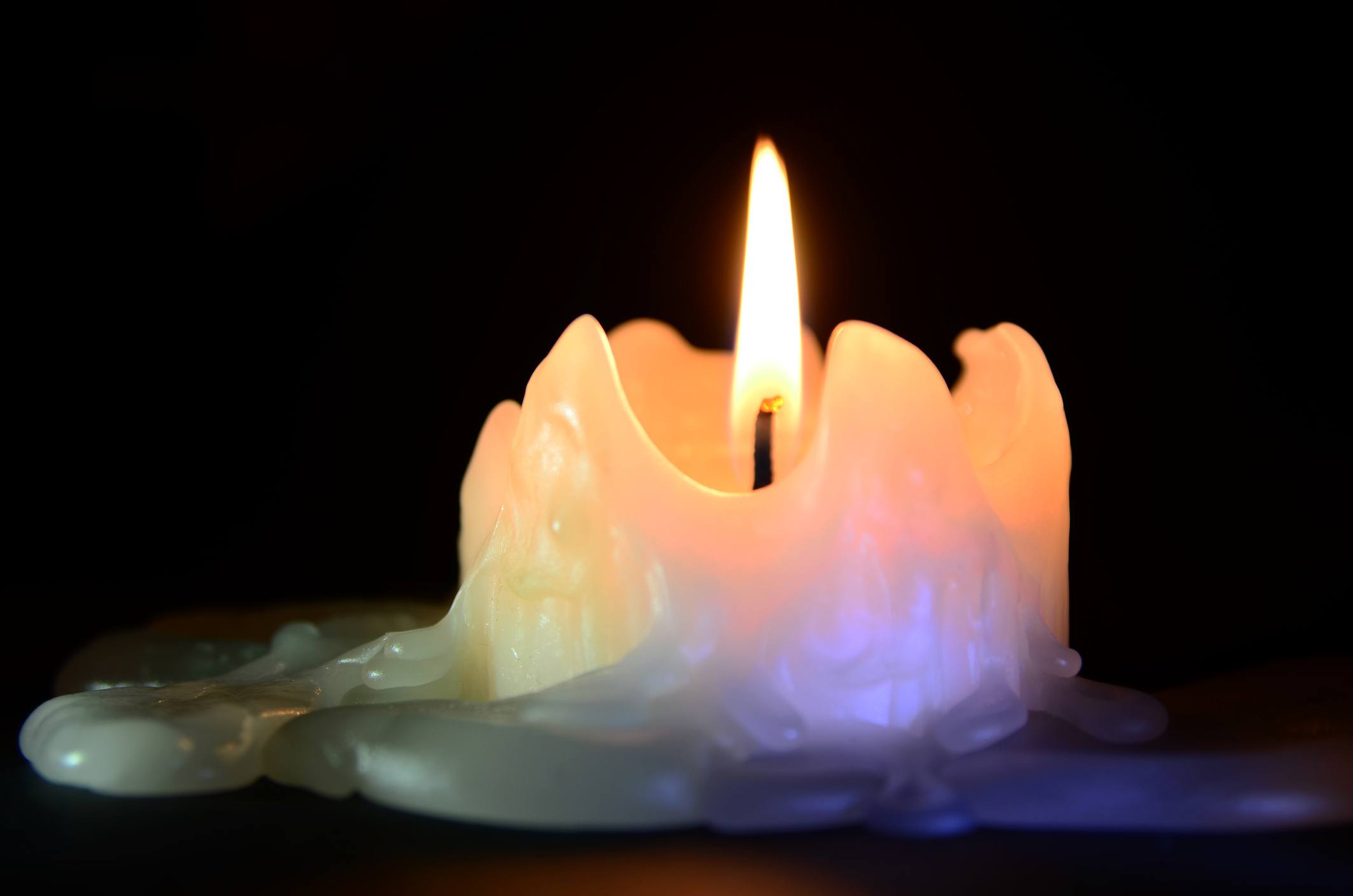A candle is an ignitable wick embedded in wax, or another flammable solid substance such as tallow, that provides light, and in some cases, a fragrance. A candle can also provide heat or a method of keeping time. A person who makes candles is traditionally known as a chandler. Various devices have been invented to hold candles, from simple tabletop candlesticks, also known as candle holders, to elaborate candelabra and chandeliers.
For a candle to burn, a heat source (commonly a naked flame from a match or lighter) is used to light the candle’s wick, which melts and vaporizes a small amount of fuel (the wax). Once vaporized, the fuel combines with oxygen in the atmosphere to ignite and form a constant flame. This flame provides sufficient heat to keep the candle burning via a self-sustaining chain of events: the heat of the flame melts the top of the mass of solid fuel; the liquefied fuel then moves upward through the wick via capillary action; the liquefied fuel finally vaporizes to burn within the candle’s flame.
As the fuel (wax) is melted and burned, the candle becomes shorter. Portions of the wick that are not emitting vaporized fuel are consumed in the flame. The incineration of the wick limits the length of the exposed portion of the wick, thus maintaining a constant burning temperature and rate of fuel consumption. Some wicks require regular trimming with scissors (or a specialized wick trimmer), usually to about one-quarter inch (~0.7 cm), to promote slower, steady burning, and also to prevent smoking. Special candle scissors called “snuffers” were produced for this purpose in the 20th century and were often combined with an extinguisher. In modern candles, the wick is constructed so that it curves over as it burns. This ensures that the end of the wick gets oxygen and is then consumed by fire—a self-trimming wick.
What are the health benefits of burning candles?
Burning candles can be beneficial to your health. Part of living a healthy lifestyle is self-care and taking care of your mind: lighting candles can provide the perfect atmosphere to induce calm and a sense of well-being. If you ever feel enveloped by fear or feel anxious, burning candles can help with anxiety. Some health benefits are much more direct: ear candling is used get rid of earwax buildup. A study conducted by Keville and Green (2009) reports that imbalances of psychological wellbeing such as depression can be improved with the use of scented candles and oils. For example, certain scented candles can help reduce feelings of fear and anxiety, reducing stress and lifting mood. Aromatherapy candles can help you relax, feel calm, energized and help your brain get into a more productive mindset. Lavender candles help ease your mind and relive stress. Eucalyptus candles are energizing and improve focus. Lemon candles also energizing and can relieve anxiety and depression.
Not all candles are created equal: some candles can actually be harmful for your health. Add scent without the soot: candles made from soy wax are soot free, non-toxic, burn clean, and last much longer than traditional paraffin which produces black soot and releases toxic carcinogens into the air.
What are the other benefits of burning candles?
Here are other ways you’ll benefit from burning candles:
Ambiance & Atmosphere: The flicker of candlelight produces a lovely ambiance that simply cannot be replicated. Lighting a few well-placed candles in your home can really add effect and create a cozy and intimate atmosphere. Adding a candle here and there will create softness in your room and instantly make it feel warm and welcoming. Do as the Danes do, light a bunch of candles for a hygge home.
Celebration & Romance: Whether you’re lighting candles on a cake or setting a romantic candlelit dinner to celebrate your anniversary with your significant other, candles are a wonderful way to mark celebrations such as birthdays, weddings, anniversaries, graduations, retirement and so much more. Candles make perfect gifts and a nice treat to yourself! Our beautifully packaged, strong-scented soy candles are hand-poured into a handcrafted upcycled beer bottle glass container and are made using a blend of all-natural soy wax and the maximum ratio of fragrance oil (almost double the recommended amount) for the best fragrance throw.
Decoration: Candles are a stylish way to add the finishing touch to any room in your house. Use subtle colors add a soft touch to any space; or go with bright, bold colors to really make an impact. Candles are very versatile, come in a variety of styles and look great in every room. Bathroom candles provide a spa-like retreat, strategically placed candles throughout your living room make it cozy and calm (very hygge), candles at the centerpiece of your dining room table keep romantic candlelit dinners within arms reach, and kitchen candles spark the atmosphere where we gather most often and can kill odors. Use candles outdoors on your patio, porch, deck and in your garden to create a magical, whimsical escape; burn a citronella candle to keep bugs away.
Fragrance: Scented candles are a perfect way to subtly add a wonderful fragrance to your space, and cover-up unwelcome odors. There are a wide variety of scented candles available for purchase in a number of fragrance types: everything from fruity to baked goods; from herbal & earthy to airy & clean, from woodsy & masculine to floral & feminine, from food & drink to seasonal & festive.
Meditation & Prayer: Lighting candles during meditation is a wonderful way to support your practice. There are many visualization exercises and manifestation techniques that involve focusing on the flame of a burning candle while sending your intentions into the universe. Candles are also used during prayer.
Remembrance & Support: Our sense of smell is strongly tied with memory, so we often associate a specific scent with a moment or memory. One of the joys of selling candles is when our customers share memories as they smell our fragrances. Not only can candles trigger specific memories, they can also be used in remembrance of loved ones we’ve lost. Our communities hold candlelight vigils to show support for specific causes. Many churches have tables where you can light a candle for a loved one.
Romance: Keep that spark alive in your relationship with a little candlelight: turn any dinner into a romantic, candlelit moment. Always keep candles on your nightstands; when the mood strikes, light it and turn up the heat – nothing enhances the moment quite like some soft lighting.
Self-Expression: Just like everyone has different tastes in fashion and music, everyone has particular fragrance preferences and everybody smells scents differently. Show off your individuality and personality by burning the scents that you love. And just like your style choices, never feel insecure about what you like. Embrace it! You do you. And if someone else doesn’t like your patchouli candle, that doesn’t make it a bad scent.
What are the side effects of burning candles?
In 2003, the U.S. Consumer Product Safety Commission (CPSC) voted to ban the sale and manufacture of candles with lead wicks. They also banned the import of lead-containing candles from other countries.
Most candle manufacturers stopped using lead in their candles in the 1970s. Due to concerns that fumes could cause lead poisoning, especially in children, lead-containing candles were removed from the market.
Most modern candles are made from paraffin wax. This type of wax is made from petroleum as a by-product of making gasoline. One 2009 study found that burning paraffin wax releases potentially dangerous chemicals, such as toluene.
However, the study was never published in a peer-reviewed journal, and the National Candle Association and European Candle Association raised questions about the study’s reliability.
According to a statement released by the European Candle Association, “They have provided no data for review, and their conclusions are based on unsupported claims. No reputable scientific study has ever shown any candle wax, including paraffin, to be harmful to human health.”
A 2007 study funded by the European Candle Association examined every major type of wax for 300 toxic chemicals. The researchers found that the level of chemicals released by each type of candle was well below the amount that would cause human health problems. At this time, there’s no conclusive evidence that burning candle wax is damaging to your health.
However, if you’re worried about the potential negative health effects of burning paraffin wax, you can try using candles made from beeswax, soy wax, or other plant-based waxes.
Burning candles releases volatile organic compounds and particulate matter into the air. Particulate matter is a mixture of extremely small liquid droplets and particles that can enter your lungs. There’s concern that extended exposure to particulate matter can lead to heart and lung problems.
Volatile organic compounds (VOCs) are carbon compounds that easily turn into a gas at room temperature. Some VOCs naturally occur in flowers to produce a sweet aroma. Other VOCs, like formaldehyde and benzine, are potentially cancer-causing.
We’re exposed to particulate matter and VOCs regularly in our daily lives. These VOCs come in the form of car exhaust, factory pollution, and anything else that burns fossil fuels.
A 2014 study examining the amount of particulate matter released from burning candles found that the amount released isn’t enough to cause health problems in humans. If you’re using candles properly in a well-ventilated space, they’re unlikely to have a significant impact on your health.
Breathing too much of any type of smoke can potentially damage your health. Burning candles made of paraffin releases soot. It’s been supposed that the combustion products from these candles are similar to those released from a diesel engine. It’s a good idea to minimize the amount of smoke you breathe in by lighting your candles in a well-ventilated room and keeping them away from drafts that can increase the amount of smoke they release.





